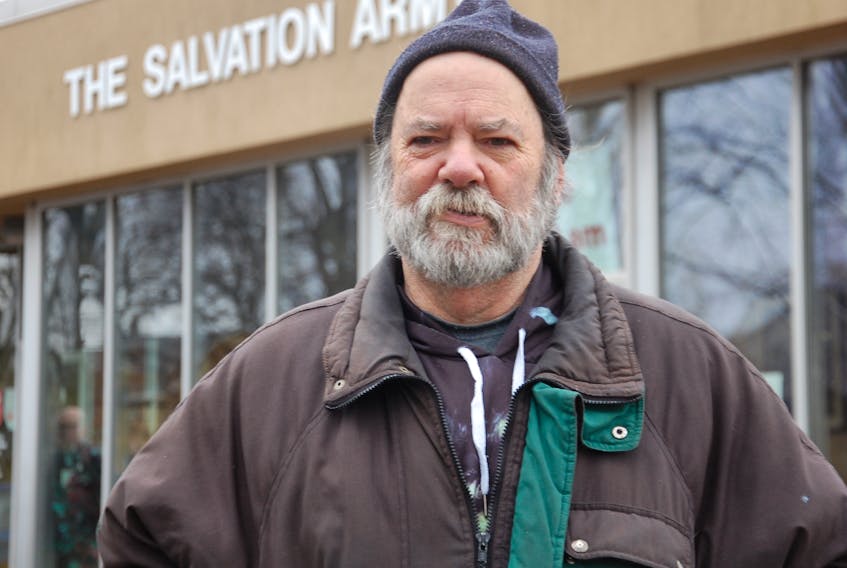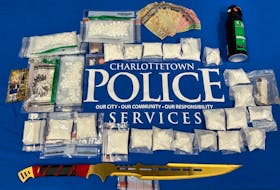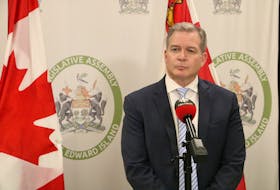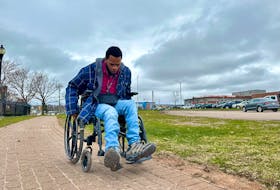Drive by the Salvation Army building on Fitzroy Street in Charlottetown most days as 9 a.m. approaches, and you might catch a glimpse of Ron Wilson waiting to get in.
Wilson, 66, of Charlottetown makes a daily trek to this Christian organization that tries to give hope and support to vulnerable people.
Sadly, though, Wilson and many other Islanders are accustomed to lives lacking the needed support to emerge from poverty.
Wilson is now retired from a work life of low-paying labour jobs in construction, farming and fish processing factories. He often lived from cheque to cheque, worried where his next meal would come from and stressed about when one job after another would come to a halt.
He also spent his share of time relying on social assistance to get food, clothes and shelter.
Wilson says he is getting by OK today, but standing in the cold outside the “Sally Ann” waiting to get in the building for a hot cup of coffee seems to belie his suggestion of enjoying relative fiscal well-being.
Still, he is certain others are in far more unsettling circumstances, like the people who talk to him about living on the street and sleeping on benches.
“I couldn’t see myself doing that,’’ he notes.
“A lot of them have to steal stuff to survive.’’
One year ago, The Guardian took the unprecedented step of devoting an entire print edition to the issue of poverty with every section telling the stories of Islanders in need and the people who help them.
The purpose was to illustrate just how prevalent the problem is and to highlight that many Islanders face great hardship.
The issue seemed to strike a chord, generating considerable discussion.
“There was a lot of praise in the province for that special edition in The Guardian,’’ notes well-known social advocate Mary Boyd.
Now Boyd hopes the government implements a poverty reduction strategy that helps many Islanders move to the healthier side of the poverty line.
After decades of strong social advocacy being met with disappointing responses and results from government, the one-woman force behind the MacKillop Centre for Social Justice can be forgiven for her skepticism over a process now underway to develop just such a strategy.
“We may well have a very good report (from the advisory council) at the end – and that is my hope – but I am not sure what will happen when it is in the hands of government,’’ she says.
Boyd is quick to highlight the fact that more than nine years ago then-premier Robert Ghiz promised his government would develop a poverty eradication policy.
That never happened.
In fact, Boyd notes, life has become more difficult, rather than easier, for many Islanders in the past decade.
She points to the recent provincial auditor general’s report that found under P.E.I.’s social assistance program clothing, household and personal requirement rates haven’t changed in more than 10 years.
Shelter rates haven’t changed since November 2013.
Related: Opposition checks in with P.E.I. government on poverty reduction progress
Meanwhile, minimum wage, which increased to $11.55 per hour in P.E.I. on April 1, has been “going up gradually but certainly not fast enough,’’ says Boyd.
She says government knows full well poverty is a major problem in the province.
Government also knows a host of actions, from creating more affordable housing to increasing social assistance, can greatly help the plight of the poor.
The key is applying sufficient pressure to get government to take needed action.
“It’s an economic problem and a lack of political will,’’ observes Boyd.
Taking action
The provincial government says it is moving on many levels to improve the plight of Islanders living in poverty or struggling to get by. Following are some of the initiatives cited by the province:
- Increases to the following: seniors and low-income home repair programs; school breakfast programs; minimum wage; child care subsidy program; social assistance food rates; personal comfort allowances
- Income Tax Act changes to help lower-income Islanders
- Introduction of Generic and Catastrophic Drug Programs, introduction of Harvest and Prosper Program, introduction of a Grandparents and Care Providers Program and introduction of Seniors Independence Initiative
- The Provincial Housing Action plan development is underway and should be released in June 2018
- Family and Human Resources Minister Tina Mundy has communicated P.E.I.'s interest in participation in a federally-supported guaranteed annual income pilot several times and as recently as March 2018 in a letter
Roxanne Carter-Thompson is hopeful she can play a part in helping to improve the plight of the poor in Prince Edward Island.
She is the chairwoman of the Poverty Reduction Advisory Council formed in early February with the mandate to provide advice and assistance to the provincial government towards the development of a collaborative poverty reduction strategy.
She has a strong belief in the diverse composition of the council, consisting of people from the private sector and representatives of non-profit organizations like the United Way and the Council for People with Disabilities. There is also a police chief and a lawyer who has been involved working within the Indigenous community and working for the rights of those who are impoverished.

In other words, this group is not only intimately in touch with Islanders facing daily struggles to put food on plates and roofs over heads, but it is deeply committed to helping make positive change.
Carter-Thompson also believes this particular government is firmly on board.
She is a long-time executive director of The Adventure Group, a group that works to give people the skills to reach their full potential, often lifting them out of poverty and into a life of greater prosperity.
She has never hesitated to be critical of government when harsh assessment was warranted, but she also notes The Adventure Group has had a strong relationship with the P.E.I. Department of Family and Human Services for many years.
“They have made great strides in looking at what (are) the needs of our clients and how those needs can be supported,’’ she says.
And it is this department that will lead the poverty reduction strategy with active participation from other government departments, municipal government partners, community and service organizations, non-government organizations, the business community and interested Islanders.
The strategy will focus on housing, food and employment.
Carter-Thompson is optimistic with the collaborative nature of the process, which will see input sought through six public meetings from late May to early June and 10 community consultations with smaller groups discussing how poverty affects lives and, most importantly, to identify solutions.
“I am very encouraged and inspired by the approach that the government is taking, that they are truly engaging the community and I think that is where you are going to see real change,’’ she says.
A spokeswoman from the Department of Family and Human Services says government cannot address poverty alone and the action plan focuses on the role of all partners.
“We must work together to ensure everyone has the chance to be self-sufficient, healthy and able to thrive in our Island society,’’ she says.









